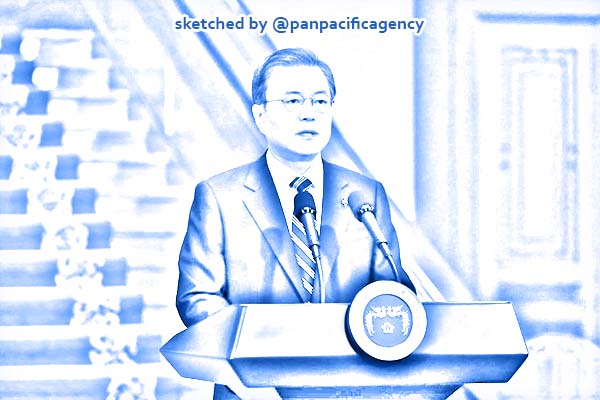[Analytics] Why the Suga–Moon Tokyo Olympics summit was cancelled

South Korean President Moon Jae-in gives his New Year’s address at the Blue House on Jan. 7. (Yonhap News). Sketched by the Pan Pacific Agency.
The relationship between Japan and South Korea since the end of the Second World War has certainly been complex. Psychological adjustments after 36 years of Japanese colonial rule were high hurdles to overcome for both countries. Yet, Japan and South Korea gradually grew close. Kazuhiko Togo specially for the East Asia Forum.
A few major events brought the two countries together: the decision by the Sato and Park administrations to normalise relations in 1965; the regaining of trust led by prime minister Yasuhiro Nakasone and President Chun Doo-hwan in the 1980s; the 1993 Kono Statement and the Asian Women’s Fund that followed. Also important were the Joint Declaration in 1998 signed by prime minister Keizo Obuchi and president Kim Dae-jung, the ‘Korean wave’ of popular culture in Japan in 2003–04 and the 2015 comfort women agreement reached by prime minister Shinzo Abe and president Park Geun-hye.
But from 2018, the relationship began to deteriorate. From the Japanese perspective, the optimistic picture of a relationship gradually improving was being dashed by South Korea. Now that South Korea had developed into a strong and well respected country, it appeared that South Koreans began to endorse a position of ‘never forgive Japan’ and all post-war efforts at reconciliation on the Japanese side stalled.
The first blow was the dismantling of the Reconciliation and Healing Foundation, which was created as part of the 2015 Abe–Park agreement and funded by Japan at the cost of 1 billion yen (US$9.1 million).
The second blow was the South Korean Supreme Court’s verdict on conscripted workers. The court’s 2018 verdict concluded that the 1965 agreements, which form the foundation Japan–South Korea post-war relations, did not resolve all injustices committed during the colonial era (from 1910 to 1945). Japan does not support this interpretation and nor did the South Korean government until recently.
The verdict was perhaps unsurprising in South Korea. The collapse of the 1965 agreements has been long predicted. But South Korea failed to recognise how severely the verdict would damage relations with Japan. Not only among Japan’s ultra-right but also deep within the Japanese Ministry of Foreign Affairs, anger grew.
But international and domestic situations can change. When US President Joe Biden was inaugurated in January 2021, he immediately made it clear that, unlike Donald Trump, he would align with countries that shared common values.
In response to the Biden administration’s exhortations, Moon immediately took a flexible approach on ties with Japan. In January 2021, he publicly recognised the 2015 comfort woman agreement and stated that the legal implementation of the 2018 Supreme Court verdict was not in South Korea’s national interest. In April 2021, a Seoul district court rejected a comfort women’s group suing the Japanese government on the grounds of state immunity. In June 2021, a Seoul district court again rejected a new case of conscripted workers suing Japanese companies, despite the Supreme Court’s extant verdict.
Japan remains practically immobile as it seeks a change of policy by South Korea. This became Japan’s stance, and it has not wavered.
Moon showed initiative by planning to visit Japan on 23 July to attend the opening ceremony of the Tokyo Olympics and hold a summit meeting with Suga. But Suga’s entourage suggested there would be no policy change on the Japanese side and the summit has been cancelled.
The Japanese government’s rigidity goes beyond fundamental diplomatic functioning and is not in Japan’s national interest for four reasons.
First, there is a sense of anger toward President Moon among some quarters of the Japanese government who feel his actions have deeply offended Japan. This is a reactionary foreign policy stance that fails to consider Japan’s national interests.
Second, in this critically difficult age of navigating trust with the United States and coexistence with China, Japan’s diplomatic leverage will be greater if South Korea is closer. With a minimum of trust, these two democratic governments can cooperate on security, supply chains, climate and COVID-19.
Third, all of the policy changes currently being suggested by Moon are a step in the right direction. There is no guarantee that negotiations will succeed. But if negotiations are not entered in order to resolve the issues, nothing can be gained. Japan may lose a window of opportunity that has only just opened. If negotiations start, there are a small number of experts in Japan ready to work hard to revitalise the 2015 agreement, and to find reconciliation between the plaintiffs and the Japanese companies accused of hiring conscripted workers.
Fourth, the toll of Japan’s rigidity may have already had consequences. In late July, UNESCO will debate a resolution on Japan’s industrial heritage in its plenary meeting in Paris. Heritage status was approved by UNESCO in 2015 on the understanding that the Japanese government will duly explain how these places contributed to the hardships experienced by Korean conscripted workers.
A special UNESCO mission investigated the Industrial Heritage Information Centre, which the Japanese government built in June 2020 in Tokyo to fulfil this obligation. The special mission concluded that the centre has not satisfactorily lived up to Japan’s obligations. Japan must now defend with sincerity its commitment to sharing these narratives at the plenary meeting in Paris.
With the Japan–South Korea summit now cancelled, the window of opportunity for rebuilding trust is closed. There is little incentive to make decisive moves on either side before the South Korean presidential election in March next year. For now, the outlook is grim.
Kazuhiko Togo is Visiting Professor at the Global Centre for Asian and Regional Research, University of Shizuoka. He was a Director General of the Treaties Bureau of the Japanese Ministry of Foreign Affairs.